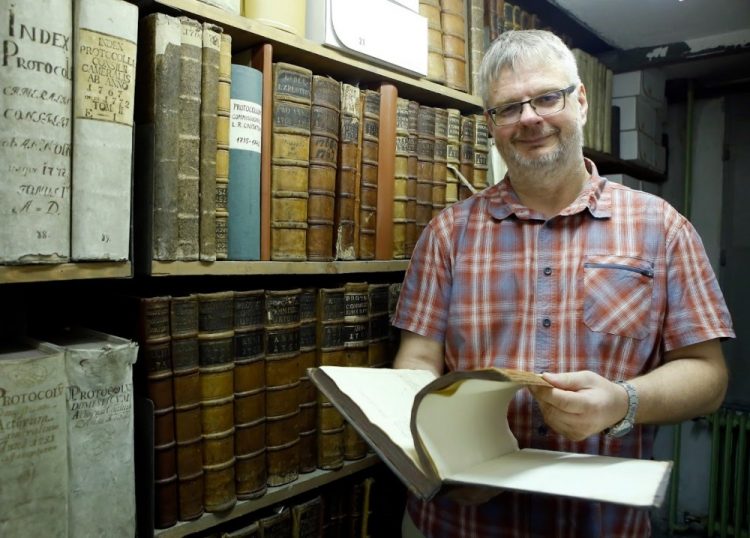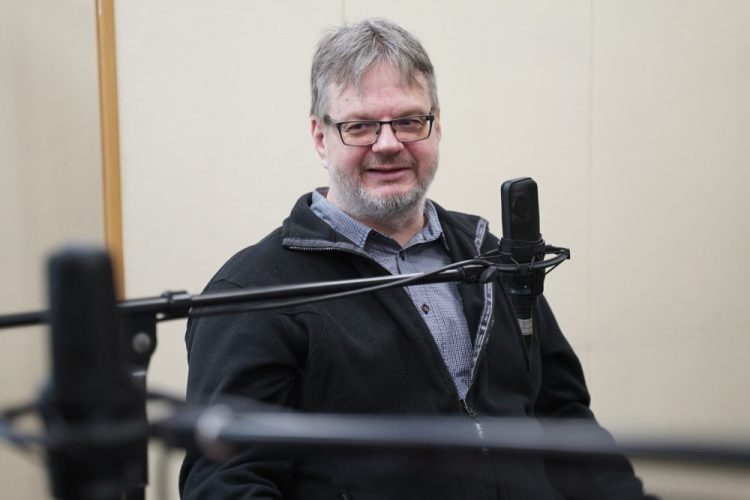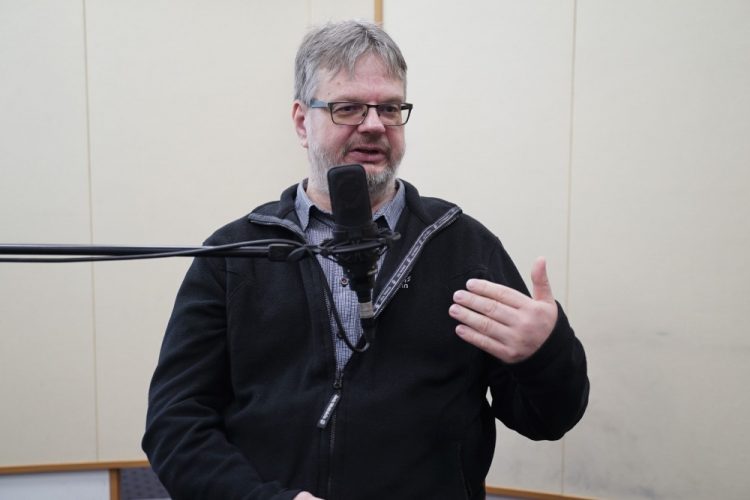
Christmas in captivity

Current Christmas is all about social distancing and restrictions for many of us. A talk with Csaba Szabó, Director General of the National Archives of Hungary on József Mindszenty’s many, many Christmas in captivity, as well as on the reasons the weapons were silent on the front only at one single Christmas during the World War I.
- As a historian and the Director General of the Hungarian National Archives, how can you break away from your job and the exploration of the past? Current weird year brings us a strange Christmas preparation, while nostalgia is going to take the lead for many families.

- Right from my childhood I have been reliving Advent, the miracle of waiting and Christmas itself, and all this has remained unchanged so far, till my age of 54. The thrill of gift waiting has gone from my life relatively quickly. Well, I’m not saying I’m not happy with the surprises, but this ranks far behind the precious time spent with my family. My father passed away young, when he was 54 only. Another reason I’m particularly fond of recalling those years, when, on the day after Christmas the entire family attended the Holy Mass together, then we went to a café for a chestnut puree dessert. This touching atmosphere, the time of listening to each other that’s what matters, and I’m still looking for it, even today. This might sound idyllic, meanwhile it reminds me that not everyone has had the chance to celebrate Jesus’ birth in this very same way. It also reminds me of József Mindszenty, Bishop of the city of Veszprém, who, together with 25 priests and seminarians, was arrested by the Arrow Cross organization and locked up in the prison of Sopronkőhida, where they had to spend Christmas as well. In his memoirs, he recorded this 1944 as his life’s most horrific Christmas ever. He likened the chaotic situation to the Mohács disaster, when the majority of the country had already fled, had died or was watching as an imprisoned how the Hungarian population was tortured and plundered by both the occupiers and the liberating army.
Persecuted nation, persecuted Jesus
- It is hard to decide what is a more serious punishment; watching over the destruction of your nation and your Church, imprisoned in your homeland, or experiencing the very same in a free country, but far away from home.
- In 1946 Mindszenty also wrote about how difficult Christmas time was. In his memoirs he made an analogy between the child Jesus’ situation, who had to be born amongst beasts since no shelter had been given, and that of the ethnic groups –Swabians, Slovaks- who were displaced from Hungary in 1946. The Advent of 1948 was quite similar for Mindszenty’s life. He did not prepare himself for a miracle, rather for being arrested. It was on the 16 th of December when he held his last episcopal meeting. At this occasion he clearly stated that all the charges against him had been untrue and false. On December 23, the Primate Palace was ravaged, hunting for evidence for his arrest by the State Protection Authority (ÁVH). Mindszenty sent for his mother, whom he was having an extremely close relation with, since he wanted her to be beside him at the time of his arrest. He was arrested on the second day of Christmas. Thus the poor Cardinal was imprisoned again, and he spent further Christmas between 1949 and 1954 behind bars in the Conti street prison. He was freed in 1956, and could celebrate this Christmas already at the United States Embassy in Budapest, where he lived for the next 15 years. His writing-table served as an altar to celebrate a Holy Mass.
- Mindszenty’s life behind bars and within strict limits can be counted in decades. Should we look into ourselves today, even a partial curfew, an obligation to stay indoors as from 8 p.m., and accepting that going out is subject to strictly defined exceptions, are hard to handle. The Cardinal himself, how could he manage to carry all that burden?
- The Church, his homeland were unquestionable authorities for Mindszenty, and he subordinated even his own personality to these values. In 1971, when he left Hungary and settled in Vienna in the Pazmaneum, at his Christmas Eve homily he underlined the Holy Family’s peace and love, drawing again an analogy between the persecuted, displaced people and Jesus’ destiny. Christ, the persecuted who redeemed the world. Mindszenty showed great sympathy with all the Hungarians forced to emigrate, leaving Hungary in mass both in 1945 and in 1956.
A drop of humanity: Christmas on the front
- You have mentioned that at Christmas of 1944 the Arrow Cross commando executed their prisoners. Where had humanity gone from mankind? It is well known for many that at Christmas of 1914, the opposing British and German soldiers climbed out of the trenches, then were singing, playing football together, and exchanged cigarettes. Why couldn’t this have been repeated next Christmas, so that the guns should have remained silent at least?
- It is since Cain and Abel that wars have existed in mankind. This Bible story well describes that not even blood bonds can prevent it. Wars turn people’s behaviour upside down. Do not think that, for example in World War II, only German and Russian soldiers committed cruel acts of violence against the population. Similar outrages, looting, brutality and rapes were committed in the Hungarian and other armies as well. In a war situation all fundamental human values are ranked behind. Those being on the fronts fall into lethargy after a while. A soldier’s life was about to witness day by day his fellow buddies’ death by fatal shots. There was the endless question: when would my turn arrive? Whenever one is preparing for the end, for death, there is the need to stand back and take stock, what has been left unsettled in life.

Goes without saying that it might trigger a sort of anger. At the time of World War I, soldiers were promised of going to a short war, and by the time the leaves fell, they might return home. Conversely, the killings went on for four years. Just remember how we name the battles and events of the war: “twelve battles of the Isonzo”, “Verdun blood pump”, all extinguished thousands of young men’s lives for futile purposes. However, at Christmas of 1914 the soldiers fighting on the opposite sides, as well as the simple people still remembered that the enemy facing them and holding a bayonet rifle, in fact was a simple man, just alike to them. A man who had also left behind his tiny house, tiny land, tiny wife and tiny life. The fact that their own lives were reflected in the enemy, might have been the reason for the 1914 ceasefire and the Christmas on the front.
Kádár’s “brilliant trick”
- The communist state parties attempted to deprive Christmas from its original meaning, from the celebration of the Redemptor’s birth. Didn’t they dare to abolish it?
- Albania, first in the world declared himself as an atheist country in 1967, since, as from 1944 the communist state power had systematically persecuted religious practice, then disbanded the denominations as well. Following the 1917 communist takeover there were similar efforts also in the Soviet Union, though all these have failed finally. After the regime change, religion has strongly returned to the Russian people’s life. In spite that churches had been previously closed, faith could not have been eradicated.
In Hungary we can consider the establishment of dictatorship as from 1948 onwards. At the last population census of the time, when people’s religious affiliation was to be assessed, two-thirds of the population declared themselves as Christians. This just cannot be eliminated in forty years.
- What kind of steps were aimed to abolish the sacredness of Christmas in Hungary?
- Kádár’s soft dictatorship did far more harm to the faith life, the Church and to people’s faith than that of the Rákosy regime. The greater the repression was, the greater the resistance, the defiance became. When people got the feeling of being treated as an enemy of the regime, they also took the power as an enemy, and the feeling was just strengthened in them: I have to keep my faith. Kádár had realised this, thus if one made no criticism of the regime and did not have a high positioned function, Kádár looked away and turned a blind eye on the churchgoers, or on the First Communion of the children taken to the grandparents’ village. If people kept their mouths shut, then they could enrich themselves, and could buy weekend lands and houses. There were thousands of ways the Kádár regime tried to loosen people’s bonds to faith. At the same time, benefits were granted, people’s attention was directed towards consumption, acquisition of goods, or even programs, like sport events were offered where participants could experience in mass together the adventures of belonging to a community.

- 1956, to what extent did it bring Kádár closer to the realization of above?
- Since 1945 eleven years have passed until 1956, meaning a mere two electoral cycles. The society was basically a civil, peasant society, in which masses were socialized in such a way that a significant part of them were deeply living their faith. The post-War World II dictatorship was taken as a regime that could not last forever. They believed that there were more thinking alike than that of their oppressors. 1956 was a huge slap for them.
They had to face the fact that though they had fought with stones, Molotov cocktails and handguns against the tanks, even they defeated them and the preachers of unfamiliar ideas, moreover they were convinced that the world stood by them in solidarity in the struggle. But it turned out not to be true.
The country remained enslaved. 1956 triggered a huge breach in people’s soul. A disillusion both for the ones staying in the country and for the emigrants as well. A huge adventure was to leave the home country and to move to another one with a single suitcase, but without any language knowledge. However, it was another adventure just to remain home. Both the Church and the civil society made their own compromises. It was Kádár’s brilliant intuition to discover this.
- What did you see of it as a child?
- I was 10 years old in 1977, thus for me it was already more than natural to attend Holy Masses. I remember attending the inauguration ceremony to the pioneer movement on Saturday, while having the First Communion on Sunday the same weekend. In the school, prior to the pioneer inauguration the ones being ahead to their Confirmation were asked to stand up. Eleven out of the class of 27 got up proudly, me myself expecting for some admiration, in return we received the teacher’s critics of being those anointing themselves with all kinds of oil in the church, right the following day of tying our traditional red ties.
As a child I was totally confused by such a speech, since for me the pioneer’s motto ‘the pioneer helps where he can’ was absolutely applicable as a Catholic as well. So, when standing there in front of the class, I was thinking that we were still a bit more than the others, since we added something to our lives, topping it with our faith to make it complete. And it became alike…
Source: gondola










